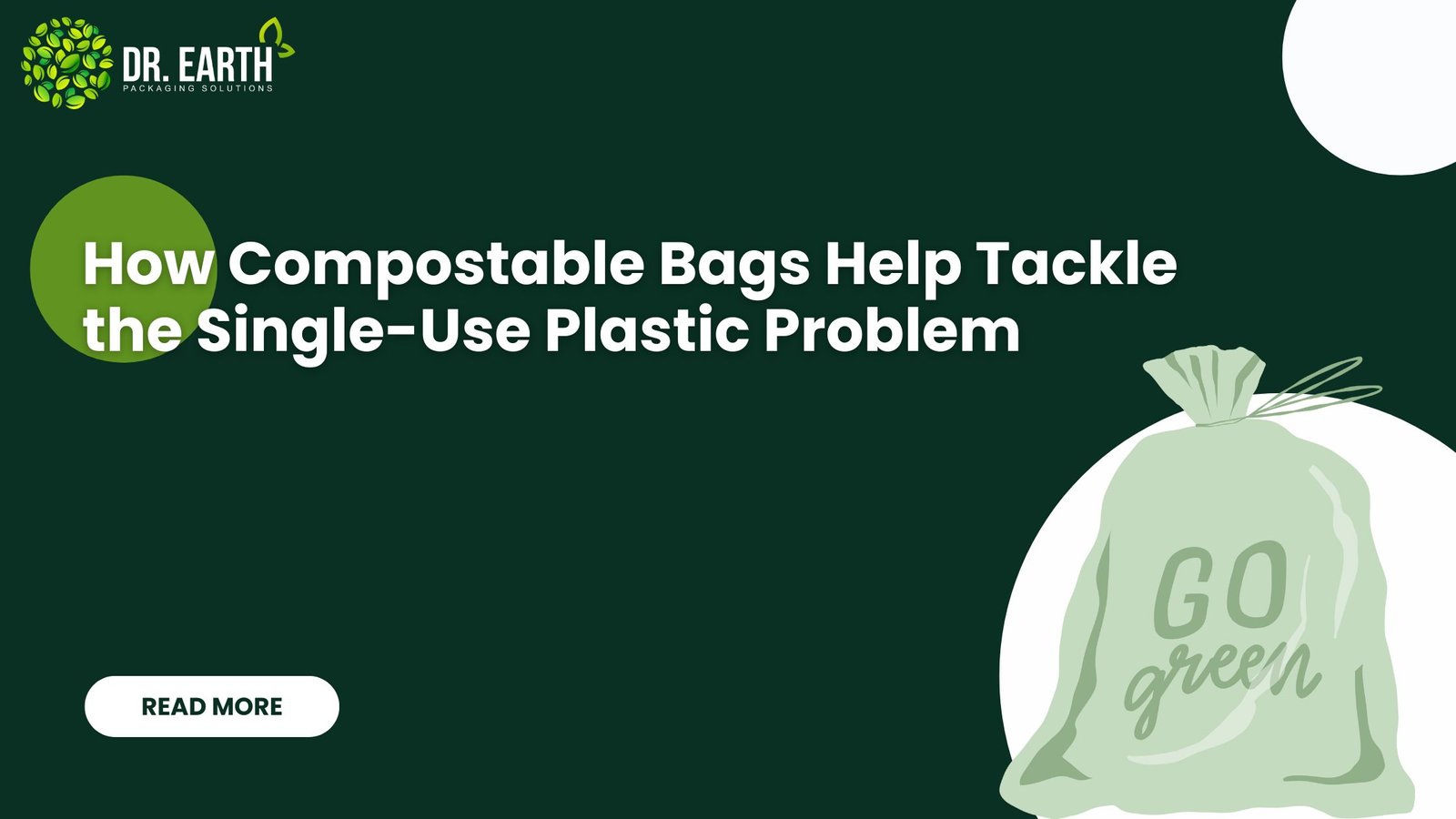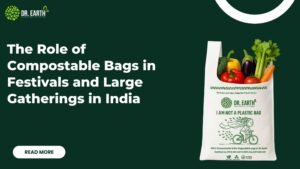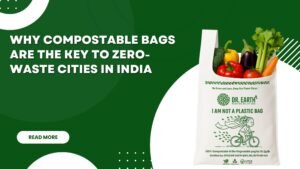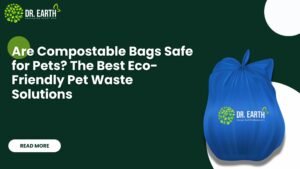
Single-use plastic has caused a very grave environmental crisis since it takes hundreds of years to break down. Thus, the material results in pollution on land and in oceans. Compostable bags have been one of the best alternatives as a means of reducing plastic waste and making the earth healthier. We are going to discuss how compostable bags reduce the usage of single-use plastic, environmental benefits, and the reasons why compostable bags are important in waste management that is sustainable.
The Single-Use Plastic Problem
What Is Single-Use Plastic?
Single-use plastic includes products such as shopping bags, straws, packaging, and utensils. Once they have served their purpose, they end up being disposed of in trash cans. The problem here is that, although plastics are so strong, they do not decompose easily and most times tend to fragment into small plastics that eventually harm animals and ecosystems.
Environmental Impact of Single-Use Plastic
- Land Pollution: Single-use plastics introduce pollution into natural environments, threatening the marine and terrestrial ecosystems.
- Health Issues: Microplastics penetrate the food chain, harm animals, and even humans.
- Carbon Emission Rate: The consumption and disposal of single-use plastic contribute to carbon emissions that augment climate change.
How Compostable Bags Offer a Solution
Compostable Bags as an Alternative to Plastic Bags
Compostable bags are sourced from biodegradable organic material that can be cornstarch, potato starch, or PLA, which will break down without emitting the chemical. As they will not emit the chemical, compostable bags can re-enter the earth as nutrient-rich organic matter that will assist the soil health and will not contaminate the earth.
Key Benefits of Compostable Bags for Tackling Single-Use Plastic
- Complete Decomposition
Under composting conditions, compostable bags degrade fully in a matter of a few months with no toxic waste and no microplastics. - Renewable Resources
Materials that comprise compostable bags come from biodegradable sources, thereby reducing the use of fossil fuels in making plastics. - Less Energy Consumption
Compared to the manufacturing of single-use plastic bags, compostable bags are often produced using less energy, which is a very green option.
Why Compostable Bags Are the Future of Waste Management
Reducing Plastic Pollution with Compostable Bags
One of the most direct ways in which compostable bags contribute to the solution of the single-use plastic problem is by encouraging sustainable waste disposal. Through the use of compostable bags, individuals and companies alike avoid using plastic bags and thereby reduce how much plastic goes into landfills and oceans.
Supporting a Circular Economy
Compostable bags are made to be decomposed and provide a great return of precious nutrients back into the soil, in contrast with a linear economy for single-use plastic. Produced, used, and dumped into landfills, where nothing of benefit returns back into the environment.
Environmental Impact of Compostable Bags
Lowering Greenhouse Gas Emissions
Compostable bags instead of plastic ones would reduce greenhouse gas emissions since when plastic degrades, it can release methane, a potent greenhouse gas. Compostable bags decompose aerobically and avoid methane production.
Supporting Soil Health
Compostable bags, when decomposed, add organic matter to the soil, thereby increasing its fertility. This is contrary to plastic bags that break down into smaller pieces that contaminate both the soil and water bodies.
How Dr. Earth’s Compostable Bags Are Changing the Game
Eco-Friendly, Certified, and Safe
Compostable bags from Dr. Earth are a wonderful alternative for daily waste collection. Here is how Dr. Earth is revolutionizing the fight against the scourge of single-use plastic:
- Certified and Approved: The compostable bags by Dr. Earth are CPCB, CIPET, and CTO-approved, ensuring that it has cleared the stringent criteria set up by the compostability standards.
- Made from Natural Materials: Unlike plastic bags, Dr. Earth compostable bags are made from plant-based materials that decompose totally and leave no microplastics behind.
- Non-Toxic Decomposition: This is the decomposition of bags without releasing harmful toxins, protecting soil, plants, and water.
How to Use Compostable Bags to Reduce Plastic Waste
Switching to Compostable Bags for Daily Use
It goes a long way in addressing the need for reduction of using single-use plastics; one can use bags for their purposes.
- Waste Disposal
Compost bags can be employed in your kitchen for composting organics. In fact, they can replace garbage bags made from plastic. - Shopping Bags
Store shopping bags, for they will be your best when shopping for groceries or shopping for other merchandise. - Storage
Pack compostable and organic materials in compost bags to pack them for making disposal through the compost bin easy for you.
Community and Business Impact
Substitute these single-use plastic bags for compostable bags distributed throughout businesses and communities and there will be a reduction in the plastic that appears all over the environment. It does make a difference.
Compostable Bags and the Reduction of Microplastics
How Microplastics Harm the Environment
When plastic bags degrade, they break into microplastics, which are nearly impossible to remove from the ecosystems. Microplastics end up in waterways and soil and are consumed by marine animals, thus ending up in the human food chain.
Compostable Bags as a Microplastic-Free Solution
Compostable bags decompose completely and therefore do not contribute to microplastic pollution. Replacing single-use plastic bags with compostable bags will limit the spread of microplastics in our environment.
Why Choose Dr. Earth’s Compostable Bags for a Plastic-Free future?
Dr. Earth believes in the power of the consumer to drive positive change in the marketplace. That’s why Dr. Earth compostable bags are a solution for the elimination of single-use plastic.
- Certified Compostable: The compostable bags by Dr. Earth are stringently tested and certified to be 100% compostable.
- Plant-Based and Sustainable: The bag made by Dr. Earth has a reduction in fossil fuel dependency, as they derive their resources from renewable sources such as corn and potato starch.
- Environmentally Safe: The bags of compost offered by Dr. Earth release nothing into the environment like toxic and microplastics, thus ensuring the future of the earth is healthy.
Conclusion
Hence, compostable bags have provided an easy solution to this issue of single-use plastic. They reduce waste, health of soil, and reduction in greenhouse gas emissions. Therefore, by choosing compostable bags from Dr. Earth, you are going towards a plastic-free future that is sustainable. With compostable alternatives, it is possible to reduce your plastic footprint while keeping your planet secure for future generations.
FAQs
Q- 1. Are compostable bags a good replacement for plastic bags?
Ans-Yes, compostable bags can be a valid replacement since they break down completely into nontoxic residues, minus microplastics.
Q- 2. How do compostable bags help with the single-use plastic problem?
Ans- As they break down organically, compostable bags also contribute to the end in landfills and give it back to the world by entering the circular economy.
Q- 3. Are Dr. Earth compostable bags certified?
Ans- Yes, the bags are endorsed by CPCB, CIPET, and CTO for being of high compostability level.
Share:
Related Posts














